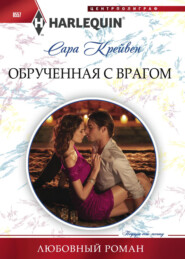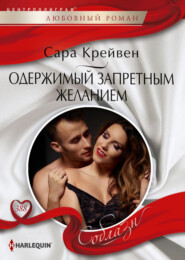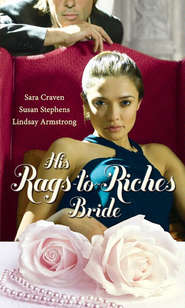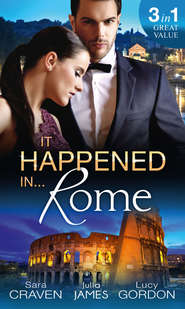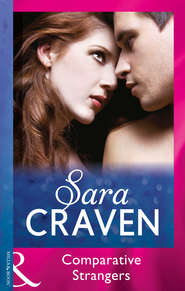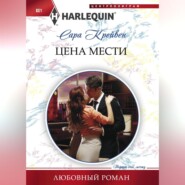По всем вопросам обращайтесь на: info@litportal.ru
(©) 2003-2024.
✖
Ultimate Temptation
Автор
Год написания книги
2018
Настройки чтения
Размер шрифта
Высота строк
Поля
They were all glaring at her suddenly, looking as if they were waiting for her to put a damper on everything. As she felt she must.
‘It doesn’t seem the right setting for that kind of thing.’ She felt about one hundred and three. ‘A lot of the furniture’s old and very valuable. And Tommaso may not want a lot of strangers on his property.’
‘Well, if you’re so uptight about it, ask him,’ Nina flung at her. ‘Get his permission at the same time you tell him about Maddalena. Ask him to join us, if he fancies it.’ She looked at her watch. ‘I’m going to look in that little boutique down the road. We’ll see you back here in an hour.’
Now I really am the outsider, Lucy thought as she climbed up through the maze of narrow cobbled streets towards the rocca. Party pooper par excellence.
She stopped to check the address Tommaso had given her, frowning slightly. She’d asked for directions at the café before setting off, but the houses in this area seemed far too shabby and run-down for the man who controlled the Villa Dante. The paint was peeling off many of them, and the roofs needed attention as well, their tiles either slipping or missing altogether.
A scrawny dog, lying in a patch of shade, lifted its head and growled at her as she went past, peering at the numbers on the doors.
Tommaso’s house was in the middle of the street. Two cracked steps led to the front door, and a broken shutter hung at a crazy angle from the main ground-floor window.
When the bell didn’t work, Lucy hammered on the door, but to no avail. There was no sound or movement in the house.
She stood on tiptoe, peering through the window. The room was totally bare. No furniture. No sign of life at all.
Lucy bit her lip as she stepped back onto the street. First Maddalena, she thought uneasily, now Tommaso. What on earth’s going on?
She glanced round, uncertain what to do next. Her phrasebook didn’t equip her to deal with errant maids and missing landlords, and she had the uncanny feeling, anyway, that she was being watched from several adjoining houses, and not in any kindly spirit either.
I’d better find the others—tell them, she decided, and began to retrace her steps, glad to get away from the mean, narrow street and its unseen eyes.
But she must have taken a wrong turning, because she found herself in a different square altogether. No bars or bustle but dominated by an elaborate Gothic church, and completely deserted apart from the statutory pigeons.
Lucy heard her own footsteps echoing as she crossed the cobbles and she paused, wondering which of the many alleys leading off the square would take her back to the town centre.
The silence was oppressive—threatening. Then suddenly it was shattered by the roar of a motorcycle coming from behind her.
The pigeons flew up in a flurry of alarmed wings. Lucy spun round, had a confused impression of two figures, leather-clad and anonymous in helmets, and realised a gauntleted hand was reaching towards her as the bike swerved in her direction.
She cried out, and tried to jump back as the hand snatched at the strap of her shoulder bag and tried to jerk it from her. But Lucy clung on grimly, refusing to let go. She heard the snarl of the throttle, warning her that the bike was about to accelerate away, and was pulled forward, falling painfully onto the cobbles. She was going to be dragged behind the bike if she didn’t release her bag.
She screamed, ‘No,’ her voice cracking, half in fear, half in anger. Then she cried, ‘Help me, someone,’ and heard a man’s voice shout in answer.
She saw a dark figure running towards her, felt another shoulder-wrenching jerk at her bag, and then suddenly the metal clips on the strap gave up the struggle and she was left lying on the ground, winded, bruised but free, her bag still clutched in both hands, while her assailants sped off with the dangling strap as their only prize.
It seemed safer to stay where she was. Her heart was pounding, she was shaking all over, and she felt deathly sick. She was dimly aware of someone bending over her, of a man’s deep voice speaking urgently in Italian, of a hand touching her shoulder.
‘No.’ She was galvanised into panicky reaction, kicking out. ‘Get away from me.’
She heard him mutter something under his breath as her foot connected with his shin. He said curtly in English, ‘Don’t be a fool, signorina. You called out for help. Can’t you see that’s what I’m trying to do? Are you badly hurt? Can you sit up?’
Wincing, Lucy allowed him to help her into a sitting position. The hands that touched her were gentle as well as strong, and a faint musky scent of masculine cologne teased her senses.
She turned her head slowly and looked at him, tensing with dismay as she realised that her saviour was none other than the man from the pavement café.
Nina’s designer stud, she groaned inwardly. It would be.
At close quarters, he was even more devastating. Handsome as a Renaissance prince, and, she acknowledged as his eyes narrowed in recognition, just as distant.
‘So, we meet again,’ he commented without pleasure. ‘What are you doing, wandering alone like this? Don’t you know it isn’t safe?’
‘I know now.’ She lifted her chin and gave him her own brand of dirty look. ‘Actually I was looking for someone, and I thought things like this only happened in big cities.’
‘Unfortunately, criminal elements from bigger places now sense there’s a living to be made even in towns like Montiverno.’ His tone was dry. ‘Now, let’s see if you can stand.’
She would have dearly loved to slap his patronising hand away, not to mention his sneering face, but she let him help her to her feet. She was bitterly aware that she was filthy from her contact with the ground, and that her new white cotton trousers were torn beyond repair. Every part of her seemed to be throbbing, and she knew an ignominious impulse to burst into tears.
Instead, she said, her voice wobbling slightly, ‘They wanted my bag, but I wouldn’t let them have it.’
‘Stupida!’ he said crushingly. ‘Better to lose your bag than be killed or maimed.’
Lucy pushed her dishevelled hair out of her eyes with a shaking hand. She said, ‘I’ve just been through one of the worst experiences of my life, and all you can do is criticise.’
‘No,’ he said. ‘That’s not all I can do. My car is nearby. I will drive you to the clinic for a check-up.’
‘No.’ The denial was instinctive and immediate, driven by some deep female consciousness that motorbike thieves were far from the only danger in the situation.
He was very still, his brows rising in regal hauteur. He said very quietly but with cool, relentless emphasis, ‘I beg your pardon?’
To add to her other ills, Lucy felt herself blushing all over as the amber eyes swept over her, slowly and comprehensively.
She said hurriedly, ‘I mean—thank you, but there’s no need for you to bother any more. I’m fine—really. Just—a little shaken.’
‘And prey, I think, to certain illusions.’ He was smiling, but there was no amusement in his eyes. ‘I am offering my help, signorina, but nothing more. I do not require sexual favours as a reward for my assistance, whatever fantasies you or your friend may enjoy,’ he added bitingly.
The contempt in his face and voice stung Lucy like a flick from a whip. There was no real reason to feel so mortified, she told herself angrily. He was a stranger to her, and she was never going to see him again, so what did it matter if he thought she was tarred with the same brush as Nina?
Yet somehow, and quite ridiculously, it seemed to matter a lot.
She said stonily, ‘Think what you wish, signore. I’m grateful for your help but not your opinion of me.’
‘Then accept my aid,’ he said. ‘Believe that I cannot simply walk away and leave you here like this.’ And, when she still hesitated, he added, ‘But on the other hand, signorina, I do not have the entire day to devote to your interests either. So please make up your mind.’
Lucy bit her lip. ‘Well—perhaps a lift back to the main square. I’m meeting my friends there.’
‘Of course,’ he said softly. ‘No doubt there will be more male talent to be reviewed. You should take care, signorina. You are not in the cold Anglo-Saxon north now. To provoke a Tuscan is to play with fire.’
She gave him a frigid Anglo-Saxon look. ‘Please don’t worry about me, signore. I’m fireproof, I assure you.’
Not that she felt it. Her abiding impression was that she had been run over by a bus, but she gritted her teeth and limped along beside him to where his car was parked in an adjoining street.
It was a sports car, naturally, black, long and low, with concealed power in every menacing line. Rather like its owner, Lucy decided, trying to extract some humour from the situation and signally failing.
She accepted his assistance into the passenger seat with as much dignity as she could muster, and sat in silence, hoping she was not bleeding onto his upholstery, as he expertly wove his way through the tangle of streets and traffic, out into the bustling familiarity of the main square again. Where he halted.
He said with cool politeness, ‘You are sure I may not take you to the clinic?’






